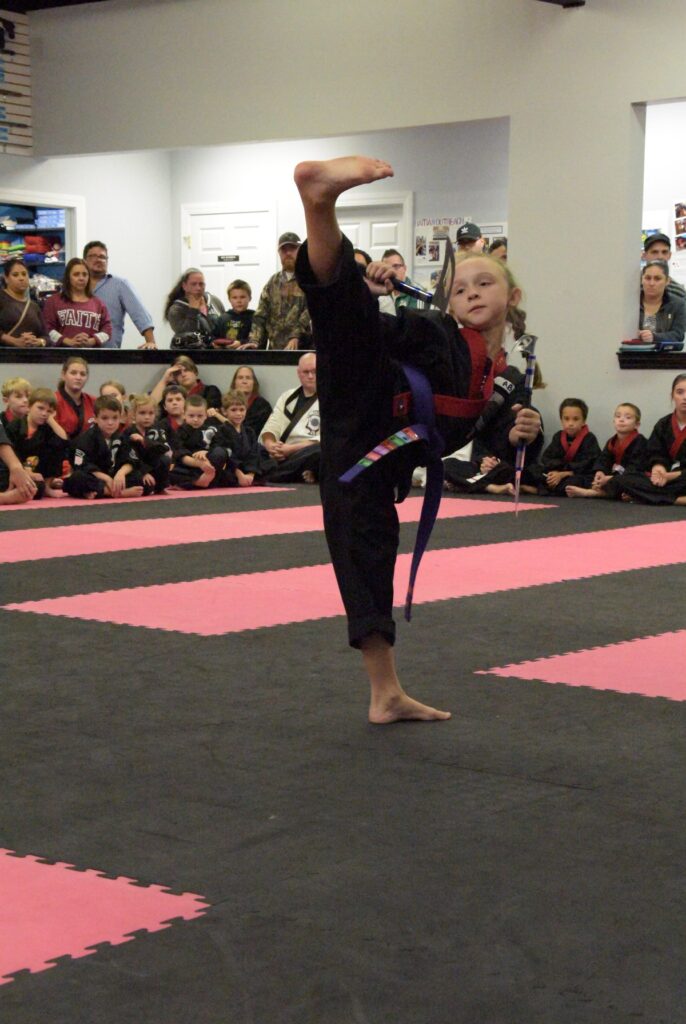Don’t become your biggest bully.

We’ve all seen the pivotal moments in martial arts films where the protagonist loses a fight unfairly, fails at a competition level, or is injured and left unable to defend themselves. The music swells, the focus returns in the eyes, the breathing responds as the inner balance grows stronger and somehow flows through, and suddenly, the underdog prevails and rallies back to either accept the loss with grace or win against the insurmountable foe.
Whatever the outcome, the study of martial arts is designed to teach you how to win and walk away while reaching your goals and to understand why it is just as important to be positive when you are at a loss or fail at any level. The most important lesson learned is how to succeed at losing.
A few bad classes don’t make you a failure.
Karate is a martial art that requires dedication and hard work to master. Unfortunately, failure is an inevitable part of the learning process. It can be difficult to stay motivated and positive when you’re not seeing the results you want in class. This is especially true when a peer reaches a goal and you don’t. You feel like you’re being left behind, that you’ll never catch up again, that you’re wasting your time, energy, and money, or that you are an embarrassment to the entire school or dojo.
Every student, Sensei or Black belt recipient, has been subjected to losing either via a few bad classes, failing a test to advance in rank and belt color, or even falling to a lower-ranked sparring partner.
The legendary Bruce Lee is an example of how even one of the best practitioners of the sport can bounce back after a loss. And the loss occurred while he was merely warming up during a training ritual.
“During the exercise, Lee felt something snap in his back. Multiple medical examinations culminated in Lee learning that he had done permanent damage to the fourth sacral nerve in his lower back. According to Bruce Lee: A Life by Matthew Polly, the actor was told by his physicians that since it couldn’t be undone, he would never be able to practice kung fu again. He was subsequently confined to a bed for three months and was unable to work in any capacity.”1.
While you might not be striving to become the next Bruce Lee, and you accept that you will have to face some setbacks, here are some tips for how to prepare mentally in advance to deal with failure in karate:
- Acknowledge Your Mistakes: Recognizing and accepting your mistakes is important. This will help you learn from them and move forward.
- Don’t Take It Personally: Failure is part of learning. Don’t take it personally, and don’t let it discourage you.
- Focus on the Positive: Instead of dwelling on your mistakes, focus on the positive aspects of your karate practice. Celebrate your successes and use them as motivation to keep going.
- Take a Break: Take a break if you’re feeling overwhelmed or discouraged. Step away from karate for a while and return when you feel refreshed and ready to try again.
- Seek Support: Don’t be afraid to reach out for help. Talk to your instructor or a fellow student about your struggles. They may be able to offer advice or encouragement. Failure is a part of learning karate, but it doesn’t have to be a roadblock. With the right attitude and support, you can use failure as an opportunity to grow and become a better martial artist.
Saving face at large-scale competitions and how to get up off the mat.
Any martial art worth studying will always include lessons in humility and how to show grace as both a winner and a non-winner. At competitive levels, the smallest trophy or certificate of participation can make or break your spirit, depending upon what side of the mat you end up on. Losing at a karate competition can be a difficult experience, but it doesn’t have to be negative. Similar to having an off day at your home small-scale dojo, here are some tips on how to deal with losing at a full scale highly attended karate competition.
- Acknowledge Your Feelings: Acknowledging your feelings after a loss is important. It’s normal to feel disappointed, frustrated, and even angry. Allow yourself to feel these emotions, but don’t dwell on them.
- Reflect on Your Performance: Take time to reflect on your performance. Think about what you did well and what you could have done better. This will help you to identify areas for improvement and will help you to prepare for future competitions.
- Learn from Your Mistakes: Don’t be afraid to learn from your mistakes. Analyze what went wrong and use it as an opportunity to grow and improve.
- Celebrate Your Accomplishments: Don’t forget to celebrate your accomplishments. Even if you didn’t win, you still worked hard and achieved something.
- Stay Positive: It’s important to stay positive after a loss. Don’t let the loss define you. Instead, focus on the positive aspects of your performance and use it as motivation to keep training and improving.
- Always honor your dojo name by respecting your opponent, their Sensei, and any other team members and training staff.
- Be gracious and be sure also to thank the referee and judges.
By acknowledging your feelings, reflecting on your performance, learning from your mistakes, celebrating your accomplishments, and staying positive, you can use the experience to help you grow and improve.
1. https://screenrant.com/bruce-lee-back-injury-acting-career-end-impact/#:~:text=During%20the%20 exercise%2C%20Lee%20 felt,nerve%20in%20his%20lower%20back.
